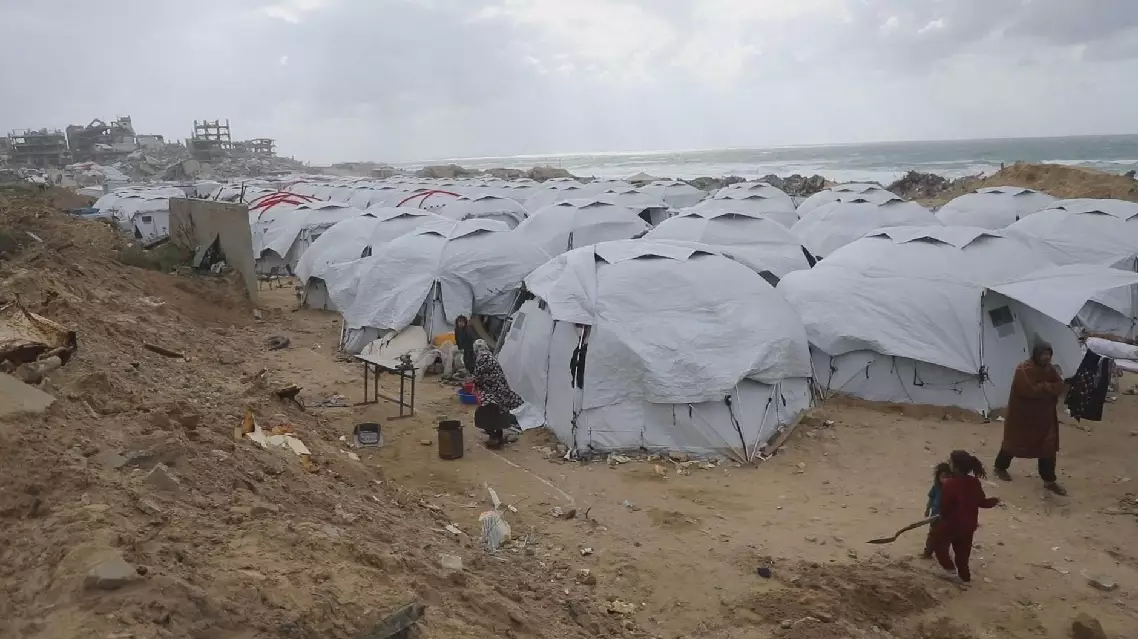The Israeli army announced on Thursday to resume ground operations in the northern parts of the Gaza Strip, forcing residents of Beit Lahiya city and the surrounding areas to flee their homes
After a two-month ceasefire, the Israeli army resumed large-scale air strikes and ground operations in the Gaza Strip. The airstrikes had killed at least 710 people and injured 900 others, said a spokesman from Gaza health authorities on Thursday.
Thursday's announcement, following an earlier announcement on Wednesday about the undergoing ground operations in the central and southern parts of the region, marks that the Israeli army would go into ground operations that cover the whole Gaza Strip.
"There was a lot of shelling around us, and there were people killed. The children were extremely terrified, so we left in a hurry without a clear destination," said Reem Naim, a displaced Palestinian at the al-Shati refugee camp.
The new round of attacks have forced thousands of Palestinians from northern parts of Gaza, mainly the cities of Beit Anun and Beit Lahiya, to flee the Gaza City, fearing that the Israeli operations might sweep through their hometown.
"Fear gripped us before we left our homes, and even here in this camp, there's still fear. We were displaced from Beit Hanoun and have moved between displacement sites more than ten times," said Ramzia Qasim, another Palestinian at the camp.
As Israeli military operations are underway, the number of deaths and injuries in the Gaza Strip has kept surging, with almost half of them being women and children.

Israel resumes ground operations in northern Gaza, forcing thousands to flee
The Iranian government is focusing on public concerns and maintaining stable supplies of essential goods amid recent protests, Iranian President Masoud Pezeshkian said in a televised interview on Sunday.
In the city of Karaj, northwest of the capital Tehran, daily life has largely continued as normal. A video filmed by a local resident on Sunday shows food stores open and grocery shelves fully stocked.
"This is the block near my home, and there are some food stores here. Daily life continues here. Last night we did not see many protests in Karaj. Right now the city is very safe. This is a grocery store close to my home. All the food is available; nothing is in shortage. Here are noodles and different types of beans. Here are dairy products, cheese, and yogurt. I also checked other grocery stores and didn't see any shortages. Everything is available," said local resident Ali Reza.
Iranian officials have described recent disturbances as acts orchestrated by the "enemy," including some carried out by well-trained and armed "terrorists." The incidents have caused casualties among security personnel and civilians, as well as property damage.
The Secretary of Iran's Supreme National Security Council Ali Larijani has directed authorities to severely punish the "terrorists."
Meanwhile, Iran's police chief Ahmad-Reza Radan said on Sunday that the police had raised alert levels and arrested several leaders of the troublemakers during the operations on Saturday.
President Pezeshkian noted in the interview that the normal demands of the Iranian people are reasonable and justified, but they must realize that triggering riots and carrying out terrorist acts are the enemy's attempts to undermine the country. He urged the public to remain vigilant.
Also on Sunday, Iranian Parliament Speaker Mohammad Baqer Qalibaf warned that Tehran would regard U.S. and Israeli bases and facilities in the Middle East as "legitimate targets" if Washington takes military action against Iran. His remarks followed media reports saying U.S. President Donald Trump is "seriously considering authorizing a strike" against Iran.
Iranian state media reported that at least 109 members of Iran's security forces have been killed in clashes since the protests began 14 days ago. Meanwhile, human rights groups based outside the country said the number of protesters killed has exceeded 200, though the figure could not be independently verified.
The protests initially erupted over a sharp depreciation of the rial and sweeping subsidy reforms. Iranian authorities have blamed the unrest on foreign-linked agents and sanctions imposed by the United States.

Iranian president says government focusing on ensuring supplies amid protests










